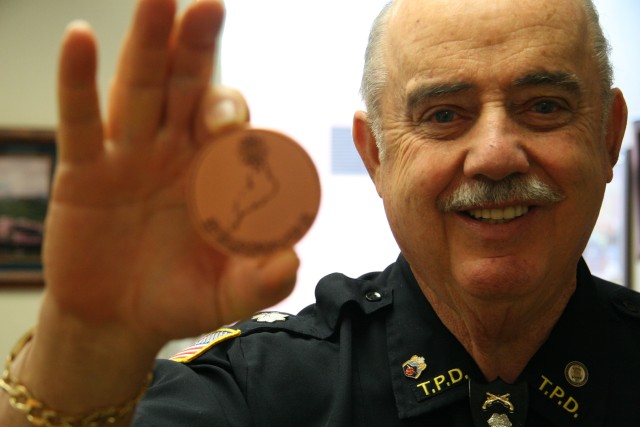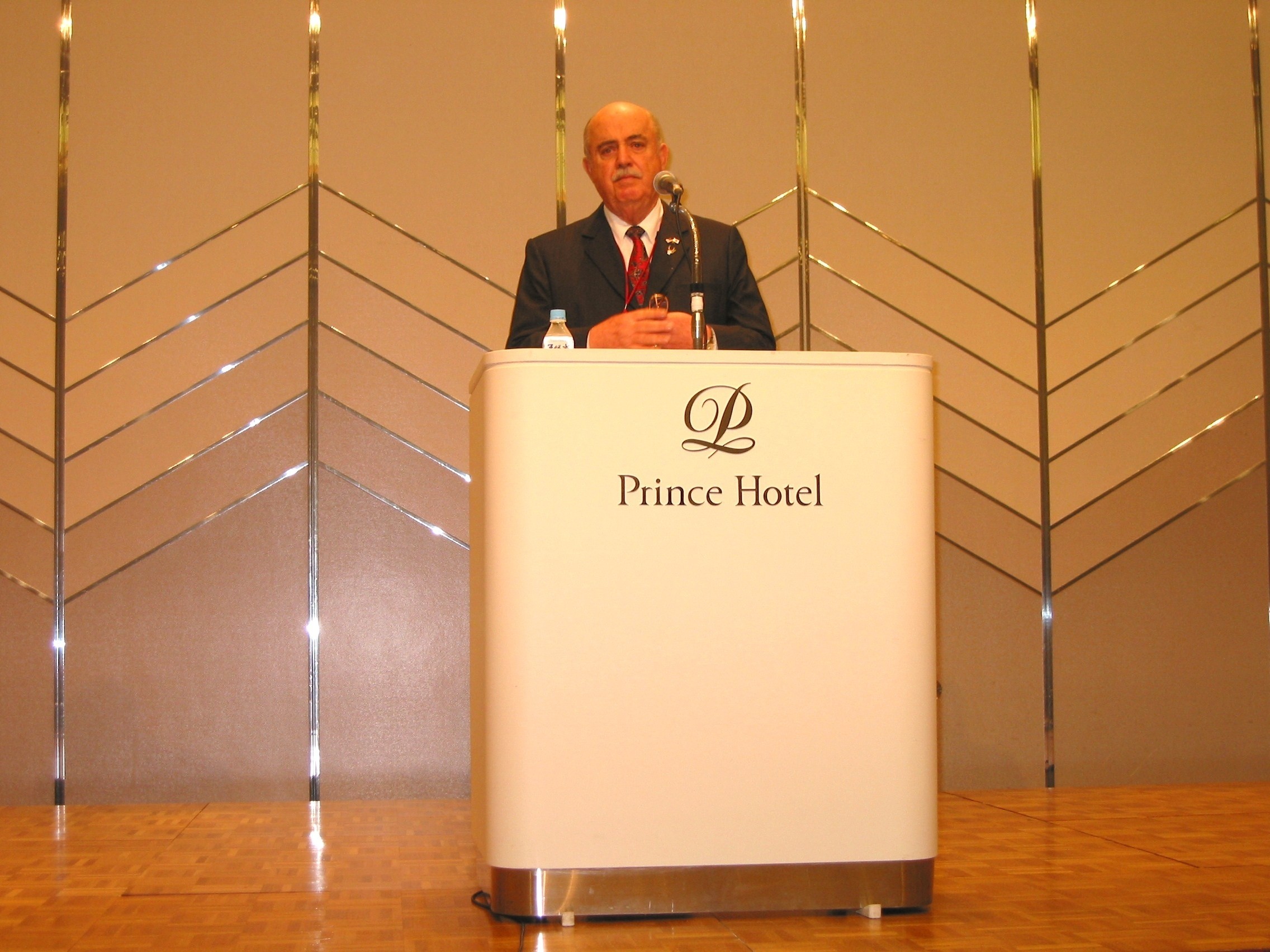Tripler's chief provost marshal is not who you might think
By Kevin Downey, Tripler Army Medical Center Public Affairs
TRIPLER ARMY MEDICAL CENTER, Hawaii - A conversation with the chief provost marshal here can be like listening to a loose jazz ensemble with wandering, unique riffs that end up together neatly in rhythm, then unlink again. When in rhythm, Don Devaney's stories reveal that he is a product of his thirty-year Army provost marshal career that took him from Japan during the Korean War to combat experience in Vietnam and beyond. But it's the seemingly unlinked individual solos of his service that eventually harmonize with the U.S. Army's role in monumental change in Asia's modern history.
A familiar face around the halls of this hospital since 1984, the retired sergeant major wants you to know he's a regular guy here. His heavy New England accent hints at his ties to the working-class manufacturing neighborhood in Rhode Island where he grew up. His fervent loyalty to Boston-area sports teams is a glimpse of the same loyalty he's shown to his country. The storyteller-at-heart is quick to recall everyday stories of bravery in uniform, not of himself, but of those with whom he's stood beside throughout more than five decades of military and civilian service to America.
It's a theme evident more than once during a freewheeling, two hour-long series of conversational riffs that range from American history to Devaney's roots to Red Sox Nation baseball fervor: an earnest, regular guy patrols these halls.
But in countries in Asia, it's different.
In Japan, he's spoken to packed auditoriums cheering his name. He's been given a Japanese name by an internationally famous high priest of Buddhism named Somon Horisawa. He's stood in rare company, waving goodbye to the reclusive emperor of Japan in a ceremony at which he was the keynote speaker in the Shiga Prefecture of Japan, near Kyoto, last month.
"Picture that, regular me standing there with the Emperor of Japan!" he exclaimed, as if he still doesn't quite believe it himself. "Me, of all people ..."
In Vietnam in 2005, he led a U.S. security detail for the Asia Pacific Military Medicine Conference, the annual multi-national forum co-sponsored by the United States and a rotating host nation. The event held in Hanoi coincided with the 30th anniversary of the end of the conflict, and demonstrated both nation's commitment to regional peace and humanity four decades later. It also coincided with Devaney's 40th anniversary of his first tour of duty during the war.
"In May 1965, I was an advisor to the army of the Republic of Vietnam as a scout dog platoon leader in the Mekong Delta at Can Tho and was awarded the Combat Infantryman Badge, Bronze Star and Air Medal at the end of my tour," he related briefly, before spending more time telling a story about a friend he served with who was killed there in the line of duty, just months before his son was born. That son grew up to be a high-powered lawyer for Major League Baseball, and flew Devaney to his office in Wash. D.C. to learn more about the father he never met.
<b>A Bridge of Peace</b>
As the U.S. Army in Japan transitioned from occupational force to ally during the years after WWII, local residents and Soldiers developed strong ties that continue to this day, often outlasting those who started them. For example, then-Sgt. Hugh O'Reilly's first trip to a dilapidated Japanese orphanage with members of the 27th Infantry Regiment "Wolfhounds" in 1949 grew into a relationship between the two nations celebrating it's 50th anniversary this past July of a tradition in which orphans from the home visit the unit in Hawaii each year. The bond O'Reilly, a retired sergeant major who passed away last year, started with Holy Family Home in Osaka, Japan, inspired the 1955 Hollywood movie, "Three Stripes in the Sun."
Peace Bridge Inc., a nonprofit organization, was founded this year to carry on O'Reilly's legacy. Devaney used the similar theme "a bridge of peace" in his speech Nov. 13 to Japan's Shiga International Friendship Association (SIFA), made up of influential Japanese business leaders, local government officials and supporters.
"One of the Army's strengths during that period was one-on-one interaction during nation building," said Devaney, who along with his Okinawan wife of 48 years, is a personal friend of the O'Reilly family. "From my experience, both sides (America and Japan) on an individual level tried to respect each other and the local customs each side had."
<b>Big in Japan</b>
Devaney enlisted in the Rhode Island National Guard as a 17-year-old in 1953 during the Korean Conflict to feel among his peers like he was doing his part to serve America. A year later he switched to active duty and was sent to locations in Japan as a military policeman. He would stay in the country with little break until 1963.
It was that time period that interested members of SIFA, whose stated mission is to foster improved relationships between the prefecture and other people and organizations throughout the world. The group was looking to build friendships with American Soldiers serving in the country during the pivotal years after WWII. Devaney received an e-mail from one of the group's influential members after an extensive internet search, establishing a pen-pal relationship.
Several years later, Devaney was invited by the organization to deliver a keynote address, as a distant relation to Commodore Matthew C. Perry, on the ties between America and Japan for a convention in Otsu, Japan, which would be attended by the emperor and empress. As part of the official party, he was selected to bid farewell to the royal couple. Local high-ranking government and police officials also escorted him around on tours of historic sights he had been to decades earlier, in addition to bestowing him with multiple friendship and career achievement medals.
"It seemed that time changes everything to some degree, yet a lot remained the same," he explained about what his return to Shiga Prefecture after more than half a century meant to him. "I was not trying to go back in time, but if we can't go back to someplace we love, then what are memories for'"
<b>Universal Wind</b>
To understand the reverence Japanese people have shown Devaney in his visits to their country is to understand the history of the United States military in the Pacific.
His Japanese name "Sofu," given to him during his vacation to Japan in April, means "universal wind," which he joked proves his destiny.
"It means I'm a born windbag," he said near the end of this lengthy chat, laughing.
Devaney talked about himself as a regular guy who's had the honor of traveling in important circles in Asia due to his Army career and the respect he's reciprocated as a guest by valuing local culture.
If Devaney's military career in Asia provided the accent notes making this impromptu jam session unique, the U.S. Army has been the root melody tidily holding the song together.




Social Sharing